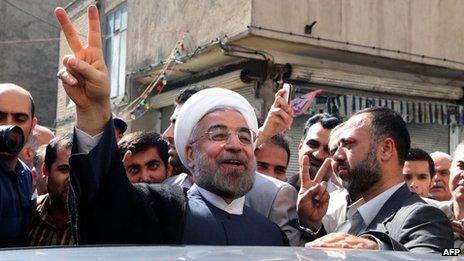Rouhani victory - time for Iran change?
- Published

The victory of reformist-backed figure Hassan Rouhani in Iran's 14 June presidential election has a number of uncomfortable messages for the country's ruling right-wing establishment.
Mr Rouhani was not the reformists' first, or even the second, choice of candidate.
Most had pinned their hopes on former President Mohammad Khatami, but he did not put his name forward. The reformists then looked to the pragmatic veteran politician Akbar Hashemi-Rafsanjani, who was disqualified from standing by Iran's top election body, the Guardian Council.
And when Mohammad Reza Aref, the only reformist candidate in the running, withdrew earlier this week in favour of Mr Rouhani, the reformists reached a consensus and threw their weight behind him.
His victory in the first round - when he unexpectedly gained 50.7% of the votes in a turnout of over 72% - has certainly emboldened the reform movement.
After four years of seeing their leaders placed under house arrest, many of them imprisoned and their media outlets curtailed, they sense that voters have given them a mandate for change.
This is despite the fact that Mr Rouhani is seen as more of a "moderate, centrist" figure, rather than a "true" reformer in the vein of Green movement leaders Mir Hussein Mousavi and Mehdi Karroubi, who are both under house arrest.
Hardline defeat
The downbeat mood of the "principle-ist" - or conservative ruling coalition - is evident by the tone of their media.
Tabnak news agency, which is affiliated to defeated principle-ist candidate Mohsen Rezai, set the agenda.
An online editorial appearing a day after the poll and before the final outcome was announced, spoke of the 2013 presidential election as a "necessary defeat for the principle-ists".
"The principle-ists must understand that they must be accountable and answerable," said the editorial.
"The principle-ists... must know that the era of monopolizing the media has ended."
The hardline Javan newspaper chose to put a gloss on the affair, concentrating on the reported high turnout.
"The Iranian nation, with its epic presence at polling stations, proved it has a strong bond with the Islamic system and again disappointed and defeated the enemy. This election, irrespective of the result, should be considered as a model for correcting the current political behaviour of groups and political activists."
The conservatives had assumed an easy ride.
Apart from controlling all branches of state power, the Islamic Revolution Guards Corps (IRGC) and virtually all the mainstream media, they have the ear of Supreme Leader Ayatollah Ali Khamenei.
So Mr Rouhani's outright victory must come as somewhat of a shock to the hardliners.
It demonstrates that the pro-reformists have returned to Iran's political arena and are a still force to be reckoned with.
"Moderation over extremism"
Mr Rouhani himself seems to acknowledge the significance of the support he received from reformers in initial comments after his win. He called it a "victory of moderation over extremism", but warned that there would be "no overnight solutions" to Iran's many problems.
He has also extended the hand of cooperation to Iran's establishment, pledging to work closely with the conservative-dominated parliament in his first meeting with Speaker Ali Larijani.
Both camps await his first encounter with the press corps on Monday, when he can expect specific questions on the economy, the nuclear issue and Syria.
But the question remains: Will the hardline establishment recognise the message of change that the electorate have sent them?